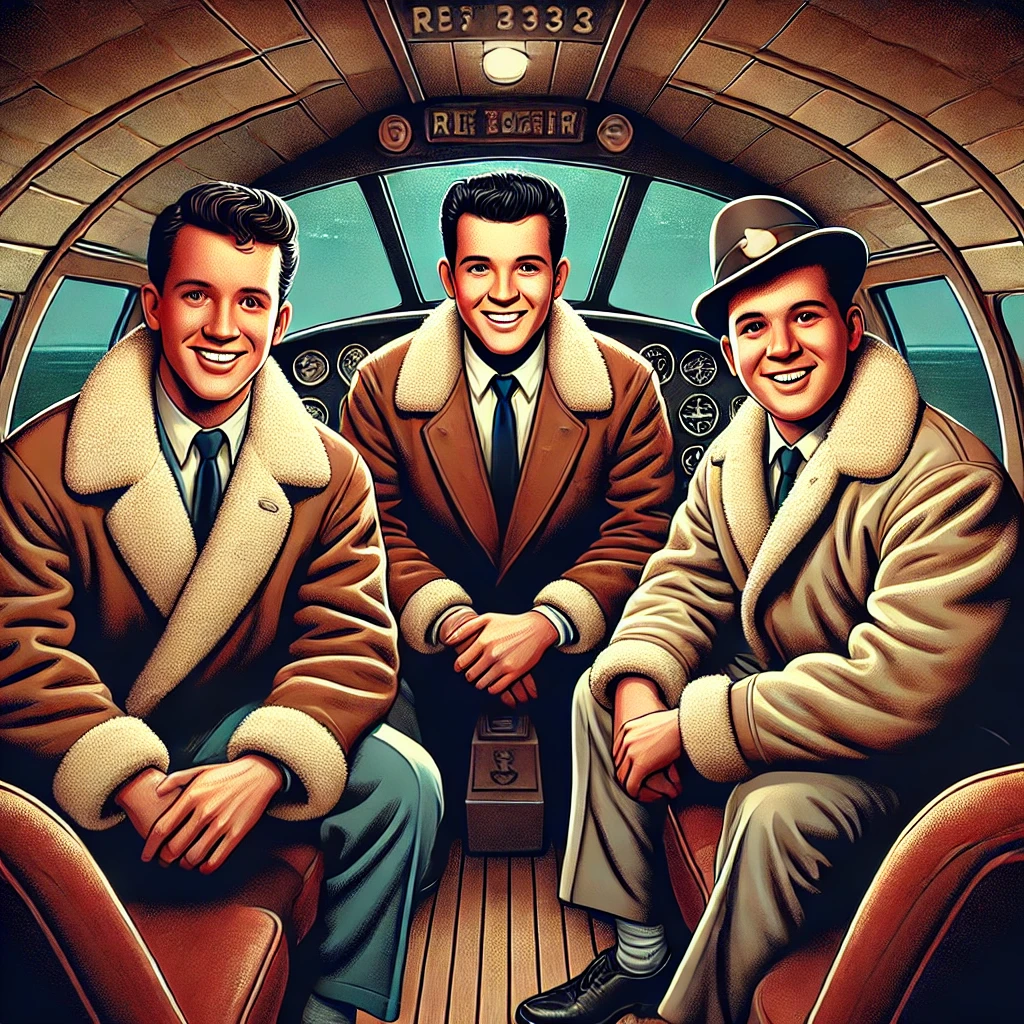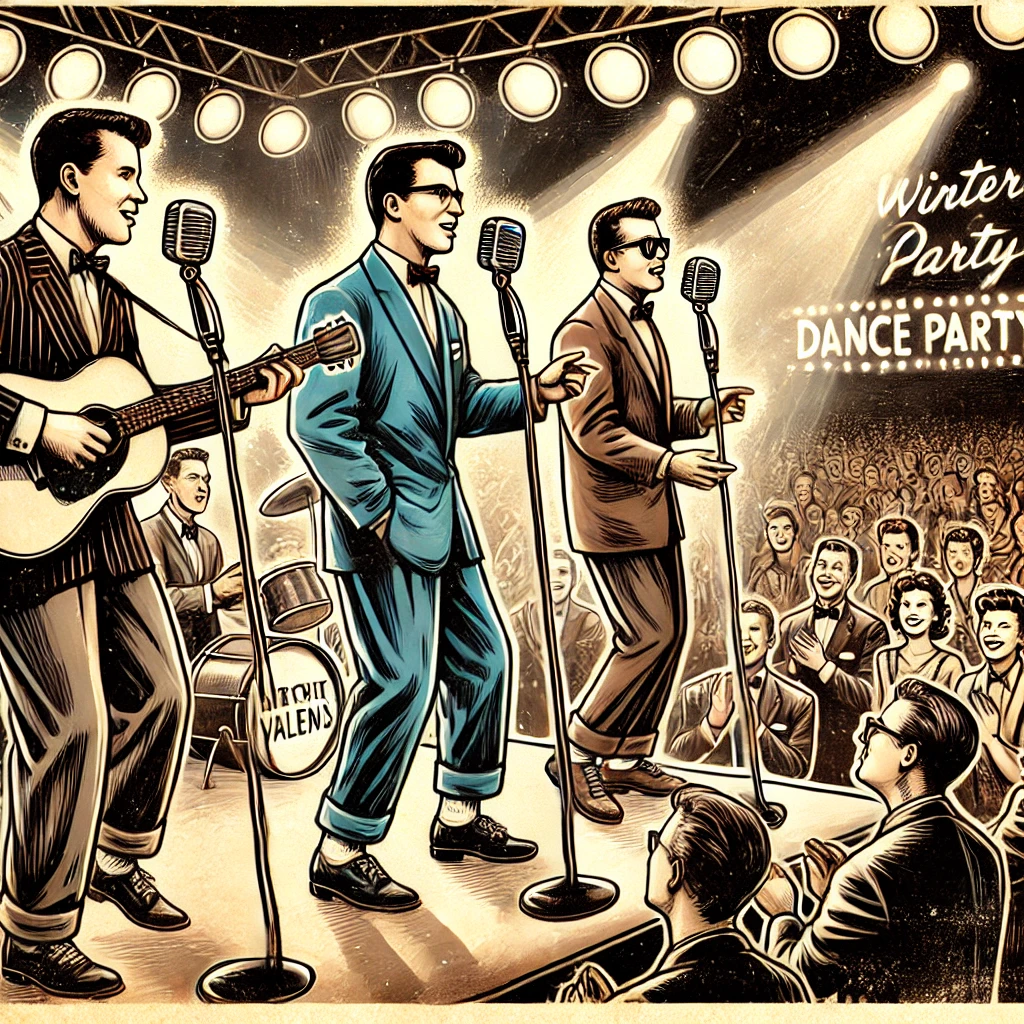A tragic day in the history of rock and roll occurred on February 3rd, 1959, as musicians Buddy Holly, Ritchie Valens, and J.P. “The Big Bopper” Richardson lost their lives in a plane crash, forever altering the course of music history. The accident, which took place in Clear Lake, Iowa, marked the sudden and heartbreaking end of three rising stars who had already left an indelible mark on the world of music. Dubbed “The Day the Music Died,” this event remains one of the most somber moments in rock and roll history, symbolizing both the fleeting nature of fame and the immense loss of young talent.

A Fateful Decision and a Tragic Flight
The three musicians were part of the “Winter Dance Party” tour, a grueling schedule of performances across the Midwest. Exhausted from long bus rides in freezing temperatures, Buddy Holly decided to charter a small plane to fly ahead to the next stop in Moorhead, Minnesota. The aircraft, a Beechcraft Bonanza, took off in poor weather conditions, with pilot Roger Peterson at the controls. Unfortunately, just minutes after takeoff, the plane crashed into a snow-covered field, killing all four passengers instantly. The cause of the crash was later attributed to pilot error and poor visibility due to a snowstorm.
The decision to board the plane was particularly fateful for Ritchie Valens and The Big Bopper. Valens won his seat in a coin toss with Holly’s bandmate, Tommy Allsup, while Richardson took the seat of Waylon Jennings, who had given up his spot as an act of kindness. This twist of fate would leave an undeniable mark on the survivors, particularly Jennings, who later admitted to feeling a deep sense of guilt for avoiding the doomed flight.

The Impact on Rock and Roll History
The loss of Buddy Holly, Ritchie Valens, and The Big Bopper sent shockwaves through the music industry. Holly, best known for hits like Peggy Sue and That’ll Be the Day, was a major influence on future rock legends, including The Beatles and Bob Dylan. His innovative approach to songwriting and recording helped shape the evolution of rock music. Ritchie Valens, a trailblazing Mexican-American artist, introduced Latin sounds to mainstream rock with songs like La Bamba, paving the way for future Latino musicians. The Big Bopper, a charismatic performer known for Chantilly Lace, had a larger-than-life personality that helped define the era’s rock and roll energy.
Their deaths also highlighted the dangers of touring for young musicians, leading to greater scrutiny of travel conditions in the music industry. In the years that followed, artists and managers took greater precautions regarding scheduling, transportation, and safety—lessons that were tragically learned too late for Holly, Valens, and Richardson.
A Lasting Legacy in Music and Culture

More than six decades later, the legacy of these three musicians continues to be celebrated. Buddy Holly’s influence can be seen in the work of countless artists, and his hometown of Lubbock, Texas, honors him with a museum and an annual music festival. Ritchie Valens’ contributions to music and cultural representation were recognized in 2001 when he was posthumously inducted into the Rock and Roll Hall of Fame. The Big Bopper’s legacy lives on through his family and fans who continue to cherish his contributions to early rock and roll.
Perhaps the most famous tribute to this tragic event is Don McLean’s 1971 hit American Pie, which poetically refers to February 3rd, 1959, as “The Day the Music Died.” The song captures the sense of loss that fans felt and has helped preserve the memory of these artists for new generations. Each year, fans gather at the Surf Ballroom in Clear Lake, Iowa—the site of their final concert—to remember and celebrate their music.
While their lives were cut short, Buddy Holly, Ritchie Valens, and The Big Bopper left behind a musical legacy that continues to inspire. Their contributions to rock and roll remain a testament to their talent, passion, and the enduring power of their music. Though February 3rd, 1959, was a day of immense tragedy, it also serves as a reminder of how music has the power to transcend time, ensuring that these legends will never be forgotten.
